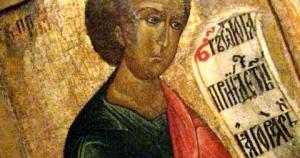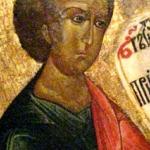 Do not devour the poor. When the weak are despised by the elite, the rich, the educated, and groan for justice, stand with them. Take your complaint to God. That’s a continuous theme in Sacred Scriptures.
Do not devour the poor. When the weak are despised by the elite, the rich, the educated, and groan for justice, stand with them. Take your complaint to God. That’s a continuous theme in Sacred Scriptures.
The Bible speaks for the powerless, because few do. The poor are too beaten down, often hungry. One way to know the powerless is they have no network, no means to speak.. They are forgotten, when “lucky” enough to not be despised.
The prophet says: speak!
The easy thing is to be silent. The easier thing is equivocation. The easiest thing is to support the powerful, even when they oppress the poor. The mealy mouthed point out the truth that following a mob or coveting the mob’s riches is wrong, but this sort of wrong happens less often than the day after day injustice, grinding slights, disabilities, that fall on the poor in an unjust age.
God defends the poor, the outcast, yet all over the globe they often do not get justice. This is the message of the prophets in the Bible. This injustice is what caused the prophet Habakkuk to groan, complain, and look to God for justice.
14 You pierced with his own arrows the heads of his warriors, who came like a whirlwind to scatter me, rejoicing as if to devour the poor in secret.
God fights for the poor, the powerless, by using the weapons of their enemies. He pierces the heads of the warriors of the tyrant with their own arrows. They mean to shoot the poor, but they shoot themselves. If we have the leisure to read these words, they should stir us, disquiet us.
We may be the self-satisfied, the safe, the Sadducees, content to welcome our Roman colonizers. The alternative is to side with God and the City of God: eternal, moral, just, merciful. Habakkuk, the Biblical prophet who most of us forget, is discouraged because he does not see justice. The elite seem to be getting away with their grift and Habakkuk loudly complains.
The good news is that God wins and God is on no side but justice with mercy.
To write such words is to cause all of us to assume we are the poor, the needy, the oppressed, because there is always some way that we might be. Injustice in a broken world is common enough that most of us can find a way that we are down and out. Yet Habakkuk learns that this is too simple: the people of God, the Babylonians, no groups is just, not one. God will bring justice and if there was not mercy, nobody would stand.
The hardest truth is that there is no community exempt from the disease of injustice. I once went to a home where there was nearly nothing, but in the midst of this poverty and oppression, a parent set themselves up as a tyrant. They were king of their dump. This man did more direct injustice than the rich man down the street. Of course, the rich man down the street was entangled in complicated societal injustice.
Habakkuk cries in dismay, because the less just sometimes punish the injustice in people more just than they are! The people of God are chastised by the Babylonians, but the Babylonians will find justice at the hands of the Medes and the Persians. All accounts are settled.
The wise man cries for mercy.
Life is enough to humble us all. We are none righteous, no, not one. Yet at our best we long for justice. God help us. Justice will come: first to the people of God and then to those who brought justice to them! Without mercy, none of us can live. The good news is that justice and mercy are coming. Thank God.











